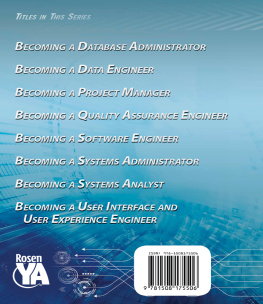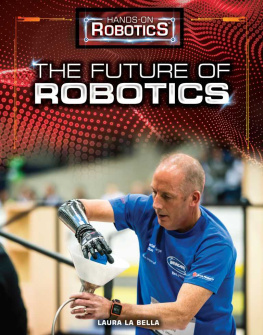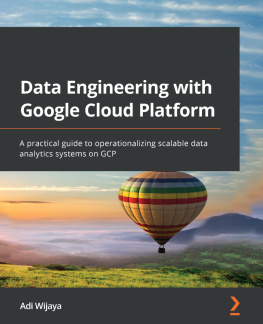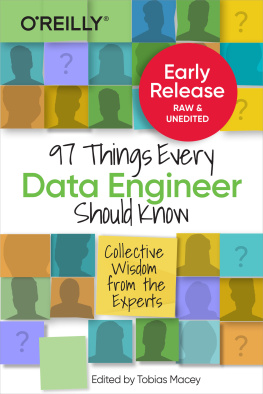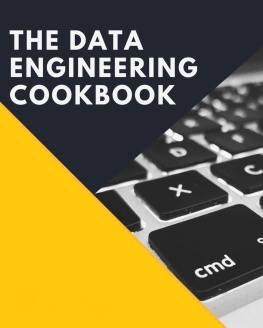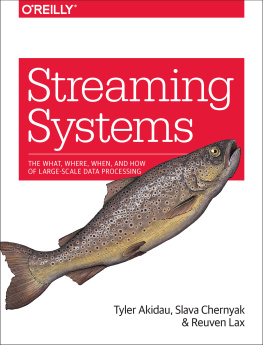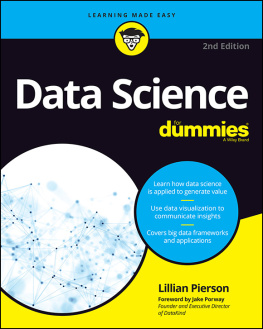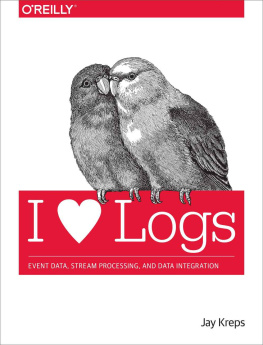Published in 2018 by The Rosen Publishing Group, Inc.
29 East 21st Street, New York, NY 10010
Copyright 2018 by The Rosen Publishing Group, Inc.
First Edition
All rights reserved. No part of this book may be reproduced in any form without permission in writing from the publisher, except by a reviewer.
Library of Congress Cataloging-in-Publication Data
Names: La Bella, Laura, author.
Title: Becoming a data engineer / Laura La Bella.
Description: First edition. | New York City: Rosen Publishing, 2018. | Series: Tech track: building your career in IT | Includes bibliographical references and index.
Identifiers: LCCN 2016056441 | ISBN 9781508175506 (library bound)
Subjects: LCSH: Database designVocational guidanceJuvenile literature. | Database managementVocational guidanceJuvenile literature. | Information technologyVocational guidanceJuvenile literature.
Classification: LCC QA76.9.D26 L3 2018 | DDC 005.7dc23
LC record available at https://lccn.loc.gov/2016056441
Manufactured in the United States of America
CONTENTS
INTRODUCTION
CHAPTER ONE
IT: A YOUNG, DYNAMIC INDUSTRY
CHAPTER TWO
WHAT IS A DATA ENGINEER?
CHAPTER THREE
THE KNOWLEDGE YOU NEED
CHAPTER FOUR
INTERNSHIPS AND CO-OPS
CHAPTER FIVE
GETTING YOUR FIRST JOB
GLOSSARY
FOR MORE INFORMATION
FOR FURTHER READING
BIBLIOGRAPHY
INDEX
INTRODUCTION
A pp developer, web programmer, database administrator, security specialist, software developerthese are some of the more traditional job titles in the field of information technology. But as the world of computing continues to evolve, new career paths are emerging to address the growing needs of an industry that is constantly changing.
The computing industry is immersed in a big data revolution. Every day enormous amounts of information are collected. Sourced from nearly every interaction we have, from smartphones, social media accounts, and internet searches to retail purchases in stores and online, satellite information, banking transactions, and more, this informationas well as all of the efforts to gather, store, organize, and analyze itis referred to as big data.
Big data has become a big deal because hidden within these massive collections of information are insights that reveal so much about so many things, from shopping behaviors and weather trends to predicting illnesses and tracking topics people are talking about. Within all of this big data are patterns, trends, and tendencies that can provide valuable amounts of information that help inform and influence companies, businesses, organizations, and the government. Big data has resulted in the need for a new set of professional skills to help organize, manage, and mine these massive reservoirs of information.
Big data sets are collected through a series of interconnected communication systems, including GPS satellites, internet searches, retail purchases, and more.
As a result of this constant stream of digital information, the demand for IT specialists to understand all aspects of this informationincluding collection, management, storage, organization, and analysisis high. It has resulted in a new breed of computing professional whose job is to oversee these different aspects of big data.
A data engineer is a new type of IT professional who combines a number of computing skills to manage the enormous amounts of data being collected.
Among a variety of career paths that have emerged since the evolution of big data, data engineers are representative of a new wave of IT professionals. Data engineers are the designers, builders, and managers of the information, creating the infrastructure needed to store, process, and analyze information. The data engineer is an IT professional that makes sure big data infrastructure functions correctly on a day-to-day basis. Data engineers develop the architecturethe set of rules and methods that describe the functionality, organization, and operation of a computer systemthat organizes, analyzes, and supplies this data in the way their employers require it. They also make sure that these complex computing systems are performing smoothly. Data engineers work as one piece on a team of IT professionals that all serve to manage the big data puzzle.
Many computing experts have already predicted a shortage of skilled workers to fill these data engineering positions. With demand this high, jobs will be available in all types of industries that seek to use big data to help better understand their businesses, their customers, and others. Its an exciting career field that will continue to grow and evolve as the big data revolution continues to advance.
As big data grows and its uses become more significant, data engineers will play an increasingly critical role in the success of how this information is stored, used, and mined.
CHAPTER ONE
IT: A YOUNG, DYNAMIC INDUSTRY
C omputing touches nearly every aspect of our modern lives. It assists us in accomplishing a wide range of everyday tasks, from the mundane (checking email, launching a smartphone app, or recording a TV show on our DVR) to the complex (diagnosing diseases, encrypting sensitive financial information, and enabling Google Maps to provide driving directions based on location). Information technology (IT) is often used to describe all aspects of computing. Its what makes all things possible when you use any type of computer or computing device, like a laptop, smartphone, or tablet.
WHAT IS IT?
IT is the study, design, development, implementation, and use of computers and computing systems, such as hardware and software, storage systems, networking, and other physical devices to collect, process, and distribute all different forms of electronic information. IT has become an essential function in nearly all aspects of daily modern life. Every single business, company, organization, and government agency uses IT, whether it is to manage manufacturing, access health records, maintain employee files, track financial transactions, run social media campaigns, engage in customer relations, communicate with consumers, share news, or otherwise. And every day, nearly every person uses a device or product such as a phone, television, or MP3 player that is powered by IT.
Computers are all around us. They operate our coffee makers and cars, enable us to stay connected, and allow us to learn more at the touch of our fingers.
IT AND BIG DATA
Collecting information and data is not a new idea. In fact, since humans began recording history, many different types of information have been collected and sharedfirst through oral tradition and then, as written language developed, using tools to transcribe information by hand and through printed means. Societies around the world documented and tracked weather trends, historical events, important scientific developments, and more.

